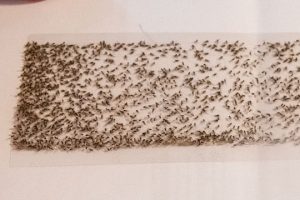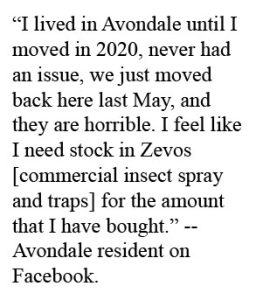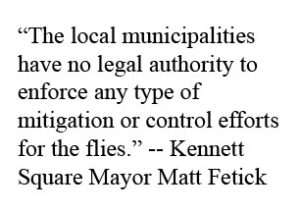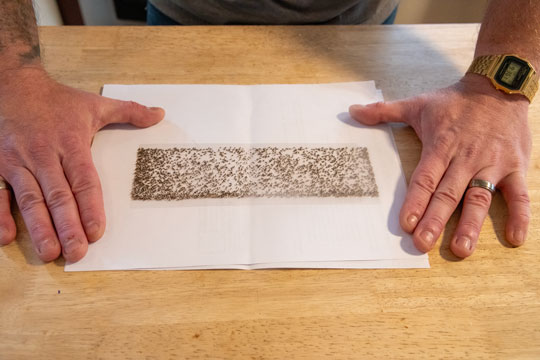Kennett Square has long billed itself as The Mushroom Capital of the World, but this past autumn the capital was invaded. The attacker? Phorid flies. Kennett Mayor Matt Fetick has issued an emergency declaration and has asked the governor for help in combatting the situation.
Phorid flies, about 1/8 of an inch in length, are a large family of flies with an estimated 3,500 species. They are also known as humpback, coffin, or scuttle flies. They live for 14-37 days and eat decaying matter, decomposing food, fungi, and even other insects found in drains or other plumbing.
They lay their eggs in the root-like area of the fungus — the fungal mycelia — the only thing the larva can eat. And it’s the fact they eat fungi that’s a problem for area mushroom growers and even residents in areas such as Kennett Square.
But it’s not just Kennett Square. The fly problem is in Kennett Township, Avondale, Oxford, Lincoln University, Cochranville, and Jennersville, according to residents posting on Facebook.
“We are experiencing this invasion in Cochranville and the Jennersville area of West Grove. But my daughter who just purchased a new home in Kennett Township has been overwhelmed with them,” said another.
A third person said, “I lived in Avondale until I moved in 2020, and never had an issue, we just moved back here last May, and they are horrible. I feel like I need stock in Zevos [commercial insect spray and traps] for the amount that I have bought.”

Nick DeMaio lives on W. South. Street in Kennett Square. He and his wife bought the house in October of 2021, he said, and there was no problem at the time. That changed this past fall.
He said he and his wife never had to use traps before. Yes, there were phorid flies, but there weren’t as many. Now, though, trying to keep up with them is almost a full-time job.
“You vacuum your windowsill; insignificant. You might do it once a week. No big deal. But this past summer it was like ‘now they’re not going away…When you finish, you’d have to start all over again.”
In previous years, he said, there might be a few at the tops of a window but this past year was different.
“As time went on, you’d see them, coming toward the center of the ceiling. It’s like traffic in here,” he said. “I went through nine bottles of caulk to seal every single window.” There are 27 windows in the home.
What was it like during the warm autumn?
 “It would put a lot of people in therapy,” he said. “It’s so defeating. If my wife wanted to have a dinner party when that was happening, you could only have people who live in the area who understand.”
“It would put a lot of people in therapy,” he said. “It’s so defeating. If my wife wanted to have a dinner party when that was happening, you could only have people who live in the area who understand.”
He added that he’s glad he and his wife don’t have children because he can’t image what it would be like to put a child down for a daytime nap with all the flies around. He’s also glad he doesn’t work from home because the flies were so bad.
“If I worked from home I would have to get an office. I would have found a way to not be here.”
Phorid flies have always been around, but they hit hard a few months ago. According to Kennet Square Mayor Matt Fetick, that’s because last winter wasn’t consistently cold enough to kill off enough of the flies and they have been a major problem for the industry and residents alike.
The flies aren’t harmful to people, they’re more of a nuisance but they can cause severe damage for the mushroom growers, Fetick said.
“They can lose 20 to 40 percent of their crop if the flies are really bad, so there’s a significant financial impact. For homes, they are a significant nuisance. This year, I’ve never had residents reach out to me as many times, [as this year], and I’m in my fourth term. I’ve never seen as many people reach out.”
Until 2012, diazinon, an organophosphate kept the flies under control, but that was taken off the home market because of health problems related to organophosphates.
“Since then,” Fetick said, there have been different things on a trial-and-error basis. There have been some other successful things that [showed] potential, but the manufacturer went out of business.”
Fetick wants a unified approach to the problem, an approach that would include the U.S. Department of Environmental Protection, the state Department of Agriculture, and the growers and residents. He requested just that from Gov. Josh Shapiro in an emergency declaration last month.
“The local municipalities have no legal authority to enforce any type of mitigation or control efforts for the flies,” the mayor said… “There are no regulatory requirements for control. Also, the products that farmers can use for control, because of food safety, have to be EPA approved.” 
What Fetick has requested from the governor is to help form a multiagency, multistakeholder task force where all the parties can get together to find a solution.
As things stand now, he said, mushroom farmers can test various products by giving up a grow room or two for a season, and then the results have to go to the EPA and the state Department of Agriculture.
“All these different pieces. You have the federal government, you’ve got the Department of Agriculture, you have growers, you have residents who are impacted.”
He added that most of the mitigation tests have been to work at the source, the mushroom houses, but there are no mitigation products for home use, something he thinks is necessary.
Fetick is looking for a multi-pronged approach. He wants the governor’s help in creating that multiagency task force, more funding to test mitigation techniques, some regulations requiring growers to use those techniques, and financial help for the smaller growers to employ those techniques. Fetick also said he wants the EPA to give mitigation a higher priority because it is an emergency situation.
Michael Wolfin, an assistant research professor in Penn State’s Department of Entomology, leads the Mushroom Fly Research Team. He was not able to respond to questions but did say in a reply to a post on Facebook that he and his team at Penn State are working to develop new control methods.
“Unfortunately, the seasonal fly populations are weather dependent. It would be best if we get 50 cold days in a row…This year was the best year of experiments we've had since 2021. We're ready to expand some methods across the industry. Other methods look good and may require some tweaking. This is the first time we've had multiple, new, commercially available technologies ready for growers to use before a growing season. The growers have been informed that they need to adopt these technologies before the fly populations become uncontrollable.”
Kennett Township also issued an emergency declaration in December and one supervisor, Geoffrey Gamble, traces the current level of infestation to diazinon being removed from the market.
In a shared email he said, “Diazinon had been used in the USA since 1956. In 2004, the EPA outlawed its residential use because of its unproven but possible potential to damage the nervous system, especially in children. It is totally non-carcinogenic. [But] the EPA has never banned its use in commercial agricultural applications. Nevertheless, the product somehow ceased to be available for commercial use in Pennsylvania. It continues to be used in other states, with workers properly trained in its application and wearing protective equipment.”
He added that until something better than diazinon comes to market, mushroom farmers should resume using it.
About Rich Schwartzman
Rich Schwartzman has been reporting on events in the greater Chadds Ford area since September 2001 when he became the founding editor of The Chadds Ford Post. In April 2009 he became managing editor of ChaddsFordLive. He is also an award-winning photographer.



Comments